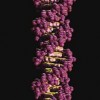DNA From The Beginning

Sleep Science
Sep 30th
Have you ever wished there were more hours in the day? I know someone who insists on extending his days by consuming energy drinks. In his opinion, sleeping is a waste of precious time. Unfortunately, for most humans, 8 hours of sleep is required to function properly. Some people can manage with far less sleep, which for those of us who really NEED 8 hours of shut-eye, is hard to imagine. For me, sometimes it seems even 8 hours doesn’t suffice, which is evidenced by my morning alarm-snooze-alarm-snooze routine, and my sofa sleeping habit in the evenings.
In an August article More >

Passing on Genes and Traits
Sep 9th
Why do you look the way you do? There are many ways to answer this question, but essentially it all comes down to the information in your DNA and the proteins your cells make. Your DNA contains genes that code for proteins. Different proteins have different functions, each contributing to your various traits and functions.
Why do we often see similar traits among parents and offspring? We inherit our DNA from our mother and father. This means we have half of our genes, or recipes, from our mom and half from our dad. Even with this basic idea, it can be More >

Teaching Genetics: Simplicity for Success
Sep 2nd
I love to talk about the biology behind how life works with other people. Some of the best conversations I have ever had have been with fifth graders learning about DNA. I am amazed that they know an incredible amount of information relating to genetics, way more than I ever knew when I was their age.
I currently teach genetics and molecular biology to middle school students, high school students, teachers, and the general public. One of the greatest skills I have learned in my current position is the importance of engaging your audience and making the material you are introducing More >

Do Genes Always Follow the Rules?
Aug 31st
As a teacher, I find that the presentation of classical Mendelian inheritance is important, but can be misleading. Do genes always follow the rules that the “Father of Genetics” observed in his garden? Don’t get me wrong, I appreciate Mendel and his contribution to genetics, but the exceptions seem much more interesting!
For example, many genes are pleiotropic, meaning they affect more than one phenotype. How about the recent development on red heads and anasthetics? I happen to live with a red head, from a long line of red heads, so in our family this was a topic of discussion for days. The mutation More >
